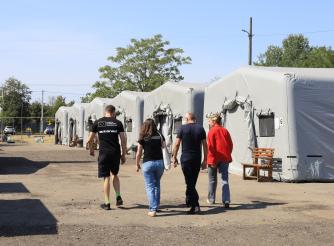“I was tired and did not have proper nutrition...Nothing to help keep my baby”: Doctors in Gaza report rise in miscarriages as pregnant women face severe stress and lack of food

Doctors on one of the only functioning maternity wards left in Gaza have told ActionAid they are seeing rising cases of miscarriages, as the lack of food and stress of constant danger and displacement takes a heavy toll on pregnant women. Staff at Al-Awda Hospital in Nuseirat, the only hospital that is currently providing maternity services such as delivery and c-sections in central Gaza, also said that pregnant women are increasingly presenting at the hospital with heavy bleeding and other complications.
Dr Raed Al Saudi, Head of Obstetrics and Gynaecology at the hospital – which is run by Al-Awda, ActionAid’s partner in Gaza, and is currently delivering between 40 and 50 babies per day, despite having just 35 beds – said in a video sent to ActionAid:
“A miscarriage can happen for several reasons. Some of which are exhaustion of the pregnant woman due to displacement... Malnutrition is one of the main reasons.”
“...We have cases of women coming from their homes with excessive bleeding. Cases of abruptio placentae or placenta previa, or postpartum bleeding. This obviously poses a great risk on the patient.”
Fadwa, 30, a patient at the hospital who sadly suffered a miscarriage, said: “[I had a miscarriage] during my second month of pregnancy. I was tired and did not have proper nutrition...Nothing to help keep my baby. My doctor said... I must take vitamins and medication such as folic acid to prevent deformation. I also needed to take medication to stabilize my pregnancy. I managed to get folic acid from the clinic but couldn’t get the stabilization medication... We searched many pharmacies but could not find it. I was told to rest. I tried to take as much rest as I could, but it wasn’t really possible.”
Dr Yasmine, Head of Inpatient and Maternity Department at the hospital, said staff had seen many cases of women losing their unborn babies. She said: “Sometimes there are cases of bleeding and premature births, or miscarriages. It is possible that cases of postpartum haemorrhage result from malnutrition, or cases of anaemia.
“The bombing causes displacement, forcing people to go from house to house, in order to avoid bombing and death. With these factors, it is possible that women can have direct bleeding or suffer from high blood pressure. This can lead to a complete separation of the foetus [Placental abruption] and a miscarriage. We deal with many cases in this situation.
“There are many women who lost their [unborn babies] as a result of direct exposure to bombing. A woman is pregnant and has an injury. On the second day or on the same day, she has bleeding. She is delivered to the operating department. These things happen a lot here.”
The lack of sufficient food – 95% of pregnant and breastfeeding women in Gaza face severe food poverty, according to the WHO – is having a major impact. Dr Yasmine said: “Most children are [born] underweight. We referred many children to Al-Aqsa Martyrs Hospital because they suffer from a lack of oxygen, or breathing difficulties or inflammation as a result of lack of hygiene, or the spread of diseases. At the same time, the woman, due to nutritional deficiency, develops anaemia, or general emaciation. So, she is unable to give birth or bear the pressure of childbirth, because she is tired and worn-out.”
Riham Jafari, Advocacy and Communications Coordinator at ActionAid Palestine said:
“It is heartbreaking but hardly surprising that the number of miscarriages is rising considering the atrocious conditions pregnant women in Gaza are being forced to endure. Not only are they experiencing the constant stress and trauma of living in a warzone, where nowhere is safe, but they have hardly anything to eat. When women are exhausted, starving and weak, what chance do their unborn babies have? Doctors are doing their very best to treat the pregnant women who come to them, many in a critical condition, but they are running dangerously low on the vital medicines they need to do their jobs – all while being utterly exhausted, overstretched and traumatised themselves. What they, and everyone else in Gaza, urgently need is a permanent and immediate ceasefire.”
ActionAid’s partner Al-Awda runs several health facilities across the Gaza strip which are all facing enormous challenges due to the ongoing onslaught by the Israeli military.
Its hospital in the Tal Al-Zaatar area, north of Gaza, was recently under siege for a total of 13 days. The siege ended on Friday and, despite damage to the building, services have now resumed.
Tragically, a health facility run by Al-Awda in the heart of the Jabalia refugee camp – the Al-Awda Health and Community Centre – which had been a beacon for the community for almost 40 years, was destroyed by bombing during the recent 20-day Israeli military incursion in the area.
The Al-Awda organisation has vowed to rebuild it, saying in a statement: “The memory of Al-Awda Health and Community Center, spanning more than thirty-nine years, encapsulates stories, tales, efforts, tears, pains, and hopes that the machinery of oppression cannot erase. Just as it began as a medical tent with a box of stories and books, we will rise again like the phoenix, gathering our scattered stones to rebuild... We will not abandon our patients, we will not leave our land and position, and we will remain with the people of our community.”
Contact the ActionAid press office on uk.media@actionaid.org or on 07753 973 486.


